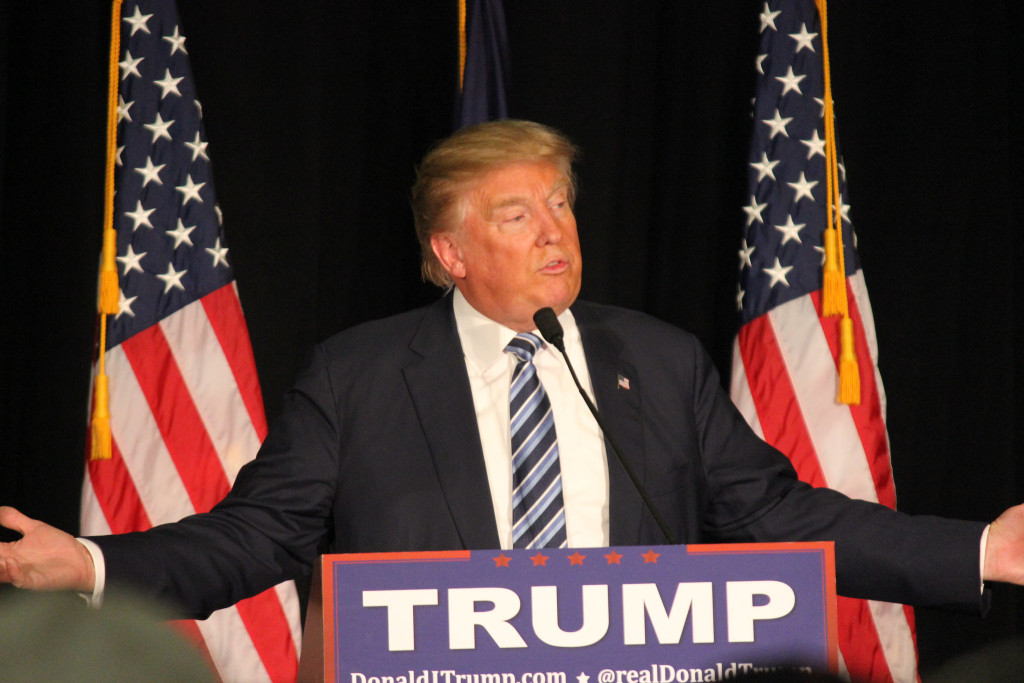
Donald Trump speaks at a December 2015 campaign stop at Mid-America Center in Council Bluffs, Iowa. Photo Credit: Matt A.J./Flickr
Christopher Beem | Managing Director of the Penn State McCourtney Institute for Democracy
As Donald Trump continues to make mincemeat of the Republican primary, the question arises: Will he do the same in the general election? Will he pummel his Democratic opponent, too, or will his strong negatives—i.e., his foolish behavior and chronic predilection to make outrageous statements—render him “unelectable?”
There used to be lots of ways for a candidate to be termed unelectable. But most of them are long in our past.
In 1924, Al Smith became the first Catholic to win the Democratic nomination for president. But so many Americans believed that his religion constituted an allegiance to a foreign political power (the Pope), that the election was effectively over before it began.
Of course, after Kennedy, Catholicism ceased to be a disqualifier in American politics. The same happened to Judaism, race or ethnicity, and gender. Though all of these certainly used to make a candidate unelectable, none of them do so today.
There are some forms of identity that still remain broadly unacceptable. Before the campaign began, in June 2015, a Gallup poll showed that large minorities of Americans were disinclined to vote for candidates who were Muslim (38 percent said no), atheist (40 percent) or socialist (50 percent).
A few months later, many Americans are voting for Bernie Sanders, who is not only a Jew (and a non-practicing one to boot), but also a socialist. So here is further evidence that these former taboos are vanishing.
Sanders receives astonishing majorities among young voters. And those same voters are least likely to see any of these three as being reason enough not to vote for someone. Only 25 percent of young voters would reject a candidate who was atheist, 24 percent a Muslim candidate and 31 percent a socialist candidate. That means that as the body politic ages, even these last holdouts are likely to disappear—and thus, perhaps too, the very idea of someone being inherently unelectable.
But unelectability is not just a matter of identity. It is also a matter of behavior. Americans expect that their presidents act, well, presidential. Until the early 20th century, for example, it was considered undignified for one to appear too eager for the office, so candidates did not campaign. In fact, they did not even show up at the nominating convention.
This conceit, too, is long gone, but the idea that candidates must meet behavioral standards remains. In 1984, for example, accusations regarding Gary Hart’s personal life derailed his 1984 presidential campaign.
So, what about 2016? Given that Trump’s behavior is so breathtakingly unpresidential, is there reason to think that the electorate might judge him unelectable as well?
No doubt, a wide swath of citizens reject his candidacy outright. An NBC poll in December showed that about half of voters would be embarrassed to have Trump as their president. Among Latinos, that number is much higher (over 80 percent). I would expect similar numbers among other groups that Trump has maligned, including Muslims, African Americans, and the disabled.
What about young people? Are they as willing to ignore behavioral standards as they are those based on identity? Do they care that the Republican frontrunner mocked a disabled person, calls his opponents schoolyard names, and refers to his manhood during a presidential debate?
Maybe not. But young people are far more concerned about the impact of hate speech, that is, speech that disparages or intimidates. A survey published in October by Yale University found that over half of college students think their school should forbid people from speaking who have a history of hate speech.
Since Trump is exhibit A for these kinds of insults, it is probable that these young people, too, are likely to reject his candidacy. But this number is not as large as it might seem. Exit polling shows that Trump is at least holding his own with young Republicans, and in some states he is the leading candidate.
So, while there are many groups who reject Trump’s behavior and therefore his candidacy, it is hardly certain that the nation at large will do so. But our electorate is split down the middle. If enough young people, disabled persons, Mexicans and Muslims—not to mention Americans who prefer that their president act like an adult—decide that Trump is unelectable, it might be enough to tip the partisan balance, and keep him out of the White House.

